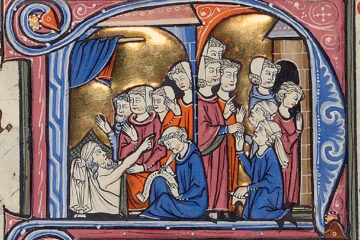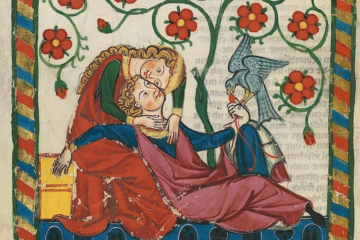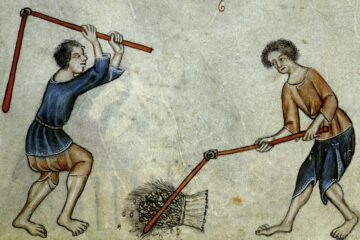Born in the small village of Lare, later to be known as Lohr, in 1118, Maria was a faithful girl. Her early life is marked by her devotion to the Catholic Church and to her county of Rieneck and the Kingdom of Bavaria. Her father was a carpenter and her mother took care of the family. She had no other siblings or close family. While still young, she joined the Catholic Church to become a nun. As a woman of the cloth, she took an oath of chastity in 1134 at 16 years old.
As the Fifty Years’ War continued to rage on, she began to speak out against the invading Franks and the would-be Emperor Torrino II. She was reprimanded on multiple occasions that her sermons for lack of a better word did not befit a woman of the Church. However, her words continued to inspire those who listened to her until one day in 1138, a detachment of the Kaiser’s army stopped in Lohr to resupply and recruit.
That day, her words also inspired one Otto, a soldier in the German armies. The two fell in love and continued a secret love affair until they eventually also got married in secret the same year. Witnesses reported seeing them walking together along the entirety of Lohr for hours every day.
On the 13th of July 1138, the armies of Kaiser Gunther II von Eppenstein amassed near Lohr, setting up a defensive position meant to stave off the approaching Imperial Army led by Emperor Torrino II Sirius. Maria and Otto parted on the battlefield before the battle began. While the other villages sought shelter in the church, Maria snuck onto the battlefield to observe the action.
Going where I went at the time, I didn’t know I would end up graced by the sight of war unadulterated. I knew I was looking upon the face of chaos and death. I knew this is the glowing forge boys go into to become either men or dead. What stung the most was knowing that somewhere on that soon-to-be field of crows, my beloved would fight for his God and his country.
I thought, why should only my man bleed for my cause? Christ bled and He died for all of us. How little could be lost if a little woman from Lohr would bleed for Him, and how much could be won?
I will walk down the avenues of war, unbattered by the waves of arrows flung at me and uncut by the hail of blades swung at me. Our Lord, my God, walks beside me. I fear nothing but His righteous judgement; I was born for this.
An extract from Maria von Lohr’s personal accounts, written in 1145, detaling her thoughts before the Battle of Lohr.
As the two armies connected, Maria rushed to her husband’s side, grabbing an axe off a fallen soldier. She charged in, unconcerned about her own safety, and struck a man in his back. Turning around, he pushed her down, but she was saved by some of her countrymen. As the man who tried to kill her died before her, his blood splattered and sprayed her clerical robes. She took off her wimple and tore her long dress and sleeves. Maria charged again into the fray, looking for signs of her husband, only to find his cold and abandoned body on the ground. She came to him and wept over his corpse.
I came upon the man I loved and then knew that there was too little time in this life to mourn the only man I would ever love. I prayed for his soul and signed the cross, closing his eyes. I took off his gambeson and chainmail and donned it as if it were my own. A horse came to me, almost trampling me under its powerful hooves. I said the Lord’s name and it quickly heeled. Seeing the bloody banner of my King, the banner of Bavaria on the ground, I straightened it out and saw it had a line of blood over it. I smeared another right across it to form the sign of the Holy Cross. I took the banner, wrapped it around a lonely lance on the ground and flew the banner high — the banner of Bavaria marked by a red cross.
I rode out along our lines and I told the men:
‘Be not afraid, for the Lord is with us. Steel yourselves and brave this battle, good soldiers. All the angels of God are watching. They give us the strength to persevere. Let us not falter!
An extract from Maria von Lohr’s personal accounts, written in 1145, detaling her account of the Battle of Lohr
In a miraculous turn of events, the German armies rerouted and reorganized and defeated the invading Franks, stopping any future advance into the Holy Roman Empire. After the battle, the King of Bavaria had Maria von Lohr honored and gave her joint command of her force, using her as a morale boost in many future battles.
She was called the Eisenmaid by her compatriots. In many a battle, she flew her banner and tended to the sick and the dying. Eventually, the King of Bavaria took her as his mistress and had a son and a daughter with her. The Queen of Bavaria did not take kindly to this development and so arranged for Maria to be ambushed and captured by Frankish forces right outside Rosewood in 1157.
Maria von Lohr’s detachment was slaughtered and she was taken in irons and brought before Emperor Torrino II Sirius to face judgment for her crimes. A public trial was held in the Main Square, with more than two thousand people in attendance; many were well-acquainted with her impact on the war. Some respected her, especially the women, but most outright vilified her. She was responsible for the deaths of countless sons and daughters. The charges brought against her were numerous: wearing a man’s clothing, witchcraft, heresy, oathbreaking, adultery, and fornication.
Emperor Torrino II: What say you to the charges levied against you?
Maria von Lohr: I say that were I at fault or no is irrelevant. You are not the Lord my God. You may not judge me as He may. Every charge you find me guilty of, the Lord will judge you on the same. If you are found guilty before Him, your soul will not be safe from the scouring of the fires of an endless and horrible Hell.
Lord Speaker: My lady, his Imperial Excellency has asked you answer whether you are guilty or not. We can leave theology to the theologians today. This is a matter of life and death.
Maria von Lohr: Am I guilty or am I innocent? I suppose I am whatever you want me to be. Your histories will be served their part nevertheless. I have done what I’ve done, but I’ve lived as I’ve lived through Christ our Lord. I have tasted the fruits of all of God’s wonders and I have still chosen to abandon flesh for the Spirit; in the Spirit there is life and righteousness. In flesh, there is only death.
Emperor Torrino II: Then you believe yourself to be in God’s grace, despite everything?
Maria von Lohr: If I have wandered astray, then I pray the Lord guide be back into His embrace. If I have stayed true, then I pray the Lord keeps me. It must be a terrible thing to know you are outside God’s love and do nothing about it.
Emperor Torrino II: Yet you are here, on trial by your enemy. Has God misled you?
Maria von Lohr: This is His design. I was led, never misled. All my actions are His will.
Emperor Torrino II: Are you implying that you consider yourself infallible?
Maria von Lohr: I am unsure. Whatever I do, I have faith it is sanctioned by the Most High.
Emperor Torrino II: So you believe God has chosen to go against His scripture in your case. What makes you sure, why you?
Maria von Lohr: I am not God. I do not know. I only believe.
Emperor Torrino II: We must judge you by the laws of men and those of God as He has dictated them. While we cannot prove your witchcraft or some other charges, you have gone against your vows of chastity and you have defiled the marriage of another man, your king no less. You are guilty of this?
Maria von Lohr: I suffer no guilt, but I have done these things, yes.
Emperor Torrino II: Then our course is clear. I, Lord Torrino, second of my name, head of the House of Sirius, Emperor of the Carolingian Empire, Successor to Augustus, Lord of the Franks, Protector of Rosewood, do hereby with the power invested in me by the Imperial Crown and the Will of God sentence you to death by hanging for the crimes of adultery and fornication in the sight of God and men. Have you any last words?
Maria von Lohr: I have, but they are for the Lord to hear. He will hear them when I meet Him beyond the valley of the shadow of death, which I do not fear for the Lord our God walks beside me.
Transcript from Maria von Lohr’s trial conducted personally by Emperor Torrino II Sirius in Rosewood 1157
Following her sentence, Maria was returned to the dungeons where she spent three horrible nights, kept under watch by men serving the Imperial Army. When she was brought out for her execution, she looked malnourished, exhausted, and headweary. However, she walked with certainty to the hangman and signed the cross before him and all of the people watching. She threw a gesture that became common among German soldiers (three fingers are extended from a fist, the ring, middle, and index, in order to form a W — the sign has a multitude of meanings, but it is mostly in reference to Kaiser Wilhelm II von Eppenstein, as a sign that glorifies the Kaiser’s cause). She was immediately bound and placed on a chair which was kicked out from underneath her. The fall instantly killed her. Witnesses report that a beam of light shone from the heavens directly onto her body. After she was hanged, her body was burnt and her ashes were poured into the Seyne, much to the disapproval of the Germans.
Maria von Lohr’s legacy continues decades after her death. Women in the Imperial court who are particularly willful and capable are often referred to as Eisenmaidens. Women in both the Imperial territories and later France would begin to adopt black eyeliners and eye shadows as cosmetics, something Maria was famous for wearing. In Bavaria, some of the men who were most inspired by Maria’s heroism banded together and formed the Knights of the Red Cross. Finally, her children, Wilhelm and Katharina went on to form two powerful German noble houses — the Von Lohrs and the Eisenmaids respectively.
Illustration: DonatoArts, Painting of Joan of Arc, August 15th 2016


